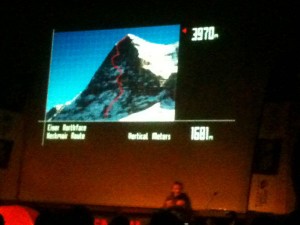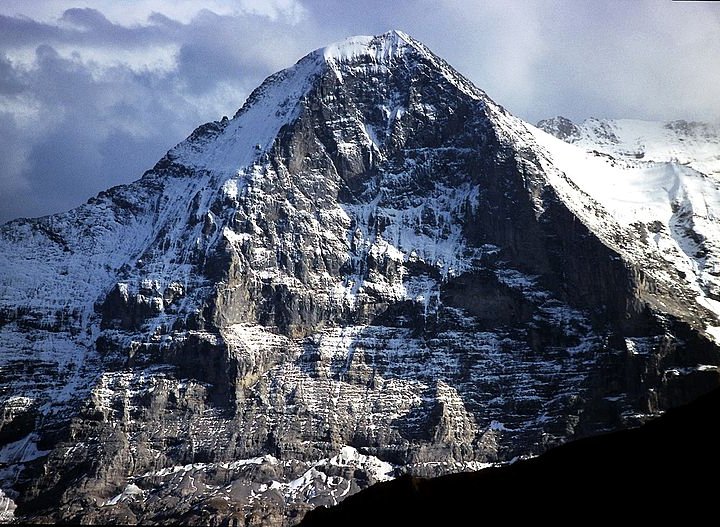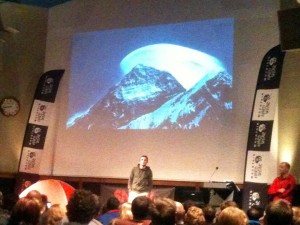If you read the title of this post and think I’m about to slag off the Swiss climbing superstar, famous for his speed ascents in the Alps and Himalayas, then you should know upfront that I’ll be doing precisely the reverse. I’ve just been to his lecture at the Royal Geographical Society in London, where I sat open-mouthed, shaking my head and emitting wry chuckles alongside a few hundred other people.

Ueli Steck first climbed the North Face of the Eiger, a mountain responsible for more epic tragedies than William Shakespeare, when he was just 18 years old. The gigantic 1800 metre wall of rock and ice near Grindelwald in Switzerland, which puts the willies up even the most gifted alpinists, has since become pretty routine for him. He has now climbed it 35 times, and did it solo for the first time when he was 28. Now 36, he was married four years ago.
“Getting married was a bit of a problem for me,” he said, amid roars of laughter from the audience. “Swiss women are very strict.”
He went on to explain, presumably tongue-in-cheek, that after he married he was no longer allowed to go away for days at a time climbing mountains, so in order to continue his hobby he needed to climb more quickly and be back home the same day. In 2007 he took his new wife, who also climbs, on honeymoon to – yes, you guessed it – the North Face of the Eiger. It took them two days to complete the climb on this occasion.
“On the first day we climbed up to Death Bivouac,” said Ueli, the place where the German climbers Karl Mehringer and Max Sedlmeyer froze to death in 1935. “Here we spent a beautiful evening together.” (More roars of laughter from the audience.)

After the ascent with his wife Ueli wanted to do a speed ascent of the North Face, but had no idea how long it would take him. His first solo ascent when he was 28 took over 10 hours, but the record at the time was only 4 hours 40 minutes. It seemed inconceivable to Ueli how anyone could climb it that quickly, but he knew the face so well by then that he felt he would be able to dispense with a rope for most of the climb except three tricky sections, the Difficult Crack, Waterfall Chimney, and the Exit Cracks. The climb took just 3 hours 54 minutes, and suddenly he was catapulted into climbing superstardom.
But it wasn’t enough for the Swiss maestro. If he could climb it so fast without really trying, how much quicker could he do it if he trained for a year? His training programme included a lot of running, training with the Swiss Olympic team (who told him he ran like a novice). To improve his climbing technique, he did some free solo climbing (forgoing all climbing aids, including protective equipment such as ropes and harness) on rock routes up to 30 metres high.
“A few easy routes,” said Ueli. “Mostly 8a’s”. Which is only not terrifying if you’re talking about pencils rather than climbing grades. This particular comment received more laughs from the audience than the one about his wife.
He also wanted to do some more endurance climbing, since he knew he was going to be on the face for a long time and was likely to get tired (though he wouldn’t be there for that long, really), so he free soloed a few easier routes in the Alps as well. This time he decided the rope was unnecessary and climbed without any artificial aids at all, the first time this had been done on the North Face of the Eiger. He started the climb at a civilised hour in the morning, while his friend sat down for a leisurely breakfast at a restaurant in Kleine Scheidegg, from where he could watch the climb through binoculars. Before he had ordered lunch he received a call from Ueli, who had just arrived on the summit after 2 hours 47 minutes. Ueli showed us a short video of the climb, filmed from a helicopter as he crawled like Spiderman up precipitous faces, the ground barely visible in the distance far below. I nearly soiled my underpants just watching, so make sure you have a clean pair ready and click on this.
The Eiger speed ascent is probably the climb Ueli Steck is best known for, but his career afterwards has been no less ridiculous. He had been up it 35 times and knew every handhold by memory. He decided to build on his achievement by doing speed ascents of the two other great north faces in the Alps, the Grandes Jorasses and the Matterhorn. He had never climbed either of the routes before, but completed the Grand Jorasses in 2 hours 21 minutes, and the Matterhorn in 1 hour 56. These climbs were also records.
It’s difficult to comprehend any of this, for climbers and non-climbers alike. I’m not a rock climber myself, and Ueli’s matter-of-fact descriptions of his climbs might have fooled me into thinking he was just like any other gifted climber, able to do things I can’t but many others can. The video footage of Ueli in action made everything look so easy. The reaction of the rest of the audience, many of whom were climbers, dispelled this notion. Wry chuckles followed nearly every comment he made. To be able to do what he has done not only requires great fitness and a brilliant climbing technique, but total confidence and absolutely no fear of heights. But he’s that much more hardcore than ordinary mortals in other ways, too. Since his speed climbs in the Alps he has extended his climbing into the Himalayas. I first became aware of him in 2009 when I was climbing an 8000m peak Gasherbrum II in the Pakistan Karakoram. I spent nearly two months camping on the Abruzzi Glacier waiting for a suitable weather window to climb, but the weather was particularly bad that year. Jetstream winds battered the summits almost the whole time, and when it wasn’t too windy, heavy snow rendered the climbing routes dangerously avalanche prone. Only two people summited Gasherbrum II that year, and Ueli was one of them. I remember him passing us on skis at Camp 1 in the Gasherbrum Cwm. We had looked at the avalanche conditions and decided the slopes above Camp 1 were unsafe. Ueli went to have a look himself and returned a few minutes later having concluded the same thing. The following day the weather was still bad, so we descended to Base Camp, but Ueli was made of stronger stuff. His ability as a rock climber meant he didn’t have to stick to the snow slopes like we did, and could find safer routes. He still had to climb through the severe wind and cold, though, and two days later he stood on the summit while we waited at Base Camp thinking there’s no way in the world we’re going up there in these conditions.

In 2011 he climbed the 2000m Southwest Face of another 8000m peak, Shishapangma in Tibet, solo in 10½ hours. What makes this climb more epic than his climbs in the Alps are the cold and the altitude. At 8000m it’s on average 48° C colder than it is at sea level, and there is only 37% of the oxygen available in the atmosphere. To pre-acclimatise for his climb he climbed 6440m Cholatse in Nepal. In the film of this climb Ueli’s climbing partner Freddie Wilkinson is heard saying, “I have never seen anyone look so comfortable on these hard technical climbing conditions.” For good measure, immediately after his ascent of Shishapangma, Ueli climbed another 8000m peak Cho Oyu, and even had a cheeky tilt at Everest from the north side, where he turned back with frozen feet below the Third Step at 8700m. He started this summit day from Camp 2 at 7800m, 400m below Camp 3, where everybody else begins the climb. Ascending without supplementary oxygen, he still caught all the other climbers and overtook them. A year later I would have been one of them. He reached the summit of Everest from the south side this year.
So when I titled this post Ueli Steck’s ridiculous mountaineering career I wasn’t being derogatory. He was born with talents other mountaineers can only dream about. In the pub after the lecture my mate Dan said to me that he takes so many risks that it’s only a matter of time before he gets himself killed, but I’m not so sure. The Alps and Himalayas are littered with the bodies of those who attempted extreme feats which were too much for them, but I don’t think Ueli is in that category. He’s so much better than the rest, and belongs in the same class as Reinhold Messner. He will continue to perform ridiculous feats of solo climbing, yet climb within himself and live to a ripe old age.
Let’s hope he doesn’t step out of his hotel tomorrow morning and get run over by a big red London bus.







It’s hard for mere mortals to understand the drive and confidence of someone like Steck. I sincerely hope that his “speed” career ends well so he can inspire us long into the future.
Thanks for another exciting post, Mark. FWIW, it was a windy -32C here last week but should yo-yo up to -5 today!
We’re having a bit of a cold snap here in London as well, but you Canadians make us look like pansies. 😉
Cheers Hoz,
Good call! saw one of his films at Kendal a couple of years ago, and although his ‘running up cliffs is the purest form of climbing’ portentious voiceovers were a little annoying, his ability is simply phenomenal. If you’re ever at a loss in November, should come up and see the festival:
http://www.mountainfest.co.uk/
cheers
mike
In fairness the pretentious voice overs are likely to be the fault of the film makers rather than Ueli. He seemed more down-to-earth and able to laugh at himself. Sponsors love that sort of thing as well. It’s a bit like those wanky montages of tackles flying in at weird camera angles set to rock music, that producers of footy programmes seem to think we enjoy watching in preference to actual highlights. Ueli’s climbing speaks for itself.
Definitely up for the Kendal Mountain Fest. I’ve been meaning to go for a while. Let’s stick something in the diary for next year.
That is an incredible story about an incredible guy. Time will tell whether your predictions on his mortality ring true! Great post Mark.
Great article Mark. Wish I had seen Ueli was presenting, shame I missed it! Ueli has kindly done a quick interview for our website. Thought you might enjoy…http://www.thedepartureboard.com/7-wonders-interview-with-ueli-steck-eiger-speed-climber
Thanks, Si. That’s a speed interview if ever there was – I hope you were able to keep up. 😉
I like the clip from the video where he overtakes two other climbers while climbing El Capitan with Alex Honnold. He showed the clip during his talk and joked that they climbed it again the following day and the climbers were still there.
Oh my god ! This guy is incredible! I don’t think most people realise what dedication and skills it takes to do what he does. I look forward to his future speed climbs!
No comments yet, I am still learning more about this guy, but fascinated by anyone’s ability to climb any mountain or rock wall, however big or small. I am a vertigo suffering armchair climbing aficionado, just finished reading a book about Mallory & Irvine’ s Everest attempt in 1924. I have stood at the foot of both El Cap and the Eiger North Face in my travels over the years, and still can’t believe how anyone climbs those things. Awesome, and properly frightening (!), doesn’t really begin to cover it.
Brilliant article, thank you.